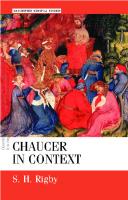Satire and allegory in Wynnere and Wastoure 0803208294, 9780803208292
121 96 5MB
English Pages [144] Year 1974
Recommend Papers

- Author / Uploaded
- Thomas H. Bestul
File loading please wait...
Citation preview
Satire and Allegory in Wynnere and Wastoure
By Thomas H. Bestul
This first full-length study of Wynnere and Wastoure is intended to provide a general introduction to the poem by placing it in its proper historical and literary setting. Mr. Bestul has given particular attention to the way the poem functions as a satire and to the related problem of its topicality. As a result of his interpretation, which empha¬ sizes the poem’s traditional nature, the usual view of Wynnere and Wastoure as merely a topical tract must be modified. A second and broader aim of the study is to throw light on the alliterative revival of the fourteenth century, of which this poem is an early exemplar. Chapter 1 explores the identity of Win¬ ner and Waster, the allegorical opponents in the debate portion of the poem. Both to some extent embody characteristics of Eng¬ lish economic life of the period, but they are best seen as representations of avarice and prodigality, and Mr. Bestul demonstrates how the poet’s conception of the two char¬ acters is indebted to the medieval Aristo¬ telian ethical doctrine on these vices. In chapter 2, which examines the poem in relation to its literary antecedents—mainly the genres of debate and dream vision—
its closest literary analogues are found to be French and English religious allegorical romances of the twelfth to fourteenth cen¬ turies. The satire of the poem, discussed in chapter 3, is directed against the greed and extravagance of Edward III, whose finan¬ cial policies are exemplified in Winner and Waster. The author points out that the satire is given form by the speculum principis tradition, which warned that a king must avoid both avarice and prodigality. Mr. Bestul’s concern in chapter 4 is to show that Wynnere and Wastoure, far from being primitive and unsophisticated, is the work of a poet with a firm grasp of the literary and learned traditions of Western Europe, one who can deal easily and confidently with complex social and national issues in a thoroughly nonparochial way. This in turn suggests that the audience for allitera¬ tive poetry was neither provincial nor un¬ sophisticated, as has sometimes been sup¬ posed. An associate professor of English and de¬ partment vice chairman at the University of Nebraska-Lincoln, Thomas H. Bestul holds his B.A. degree from the University of Wisconsin and his advanced degrees from Harvard University. He has contributed to Speculum and Neuphilologische Mitteilungen.
Satire and Allegory in Wynnere and Wastoure
Satire and Allegory in Wynnere and Wastoure By Thomas H. Bestul
University of Nebraska Press • Lincoln
Publiihtn en Mr Plum
unp \ Copyright © 1974 by the University of Nebraska Press All rights reserved
International Standard Book Number 0-8032-0829-4 Library of Congress Catalog Card Number 73-77750
The publication of this book has been aided by a grant from Hyder Edward Rollins Fund.
Manufactured in the United States of America
3









